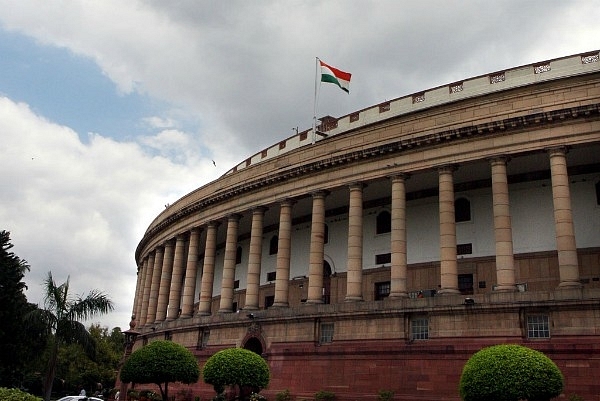Ideas
Why EWS Criteria Ought To Be Different For Education And Public Employment
- Parliament passed a landmark bill reserving 10 per cent of government jobs for the economically weaker section.
- In the context of reservation, here’s why there should be two sets of norms for education and public employment.

Indian Parliament on a cloudy weather in New Delhi, India. (Arvind Yadav/Hindustan Times via Getty Images)
This salutary explanation, sought to be inserted by the Constitution (124th Amendment) Bill, 2019, passed by both Houses of Parliament, steers clear of straitjacketing this important touchstone of economic deprivation, affecting the fortunes of students and those seeking public employment.
Media reports speculate on the following two important touchstones, among others, of economic deprivation – family income not exceeding Rs 8 lakh and land holdings not exceeding five acres. To be sure, while there cannot be any smoke without fire, the Narendra Modi government deserves applause for steering clear of rigidities, especially given that the Economically Weaker Sections (EWS) definition or parameters in the Constitution cannot be amended at the drop of a hat.
Both the Rs 8 lakh income criterion and the landholdings criterion would have had the effect of casting the criteria of economic deprivation on stone, whereas prudence lay in keeping them open-ended and amenable to change in the light of experience and received wisdom.
The putative Rs 8 lakh income criterion has at once received flak on the ground that it equates a lowly peon, with an annual income of Rs 1.50 lakh, with a middle-level executive drawing an annual salary of Rs 6 lakh.
One can defend this latitudinous criterion on the ground that at the time of admission into an institution of higher learning, the wise men and women constituting the admission board would nod in favour of the ward of the peon, but such affirmative action is in the realm of subjectivity and uncertainty. Affirmative action gives considerable latitude. One hopes that states, while defining EWS in a flexible manner, do not give any latitude that can possibly foster corruption.
There should be two sets of norms for education and public employment in this regard given that while a student has to pay their benefactor, a public employee will receive a salary from their benefactor. Experience shows that students admitted under the Scheduled Caste/Scheduled Tribe/Other Backward Classes reservation still find it difficult to pay their way through for their four-year engineering degrees in private colleges unless rescued by generous scholarships from the state or philanthropists.
Furthermore, the fount of inequality of opportunities is at the point of education. If this is addressed meaningfully, perhaps the beneficiary might not look for reservation to rescue them in the employment market. At any rate, a desire to study further needs a more sympathetic approach than the desire to call it a day in the matter of education and settle for the comfort of a government job. Therefore, the criteria for economic backwardness ought to be more liberal vis-à-vis the ones for public employment.
Nor should the Other Backward Classes (OBC) creamy layer criterion of family income of Rs 8 lakh be extended to the EWS in a spirit of “one size fits all”, given that apples cannot be compared with oranges. The OBCs are a different kettle of fish with a larger percentage of reservation – 27 per cent. But EWS members have to compete fiercely for space in a small sliver of reservation.
It is significant to note that the EWS reservation extends to private colleges as well, which are known to charge exorbitant fees. While reservation would get them entry, who will pay their way through? This cannot be brushed under the carpet. A private educational institution is likely to be loath to provide scholarships across the board for the quota category. Nor can it be expected to take the additional costs in its stride.
Fortunately for the government, there is a parallel that can guide it. The then Human Resource Development minister Kapil Sibal’s diktat to public schools to give free education to children of the weaker sections to the extent of 25 per cent of the class strength resulted in huge resentment from such schools, leading to children getting a pariah treatment both from the school and fellow students.
The government cannot deflect its burden on private educational institutions. It should either provide liberal scholarship or subsidise education loans for the reserved categories in institutions of higher learning.
While on the subject of reservations, it might not be far-fetched or unreasonable to give them with a rider – the beneficiaries in educational institutions would serve the nation for at least five years. Scandinavian countries demand this of everyone, whether a national or a foreigner, on the rational ground that they provide education free of cost. There is no reason why the Indian state should also not provide educational reservations with a rider.
This can be done for EWS more easily and without legal challenge now that the definition of EWS has been left open-ended. The scheduled and OBC candidates perhaps cannot be bound with such a national duty unless the Constitution is amended yet again.
Introducing ElectionsHQ + 50 Ground Reports Project
The 2024 elections might seem easy to guess, but there are some important questions that shouldn't be missed.
Do freebies still sway voters? Do people prioritise infrastructure when voting? How will Punjab vote?
The answers to these questions provide great insights into where we, as a country, are headed in the years to come.
Swarajya is starting a project with an aim to do 50 solid ground stories and a smart commentary service on WhatsApp, a one-of-a-kind. We'd love your support during this election season.
Click below to contribute.
Latest